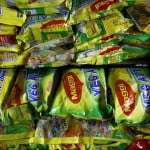According to a WTO communique, the EU was “very concerned,” about the trade distortions under their WTO commitments, and wanted to know what will happen to imported apples that are brought through other ports and the rationale for such a measure.
According to a WTO communique, the EU was “very concerned,” about the trade distortions under their WTO commitments, and wanted to know what will happen to imported apples that are brought through other ports and the rationale for such a measure.
Pointing that the measure has so far had an impact on trade, the US said the change in policy was not notified well in advance. New Zealand, Chile, and Australia also echoed these concerns.
In its response, India maintained that the measure does not fall within the definition of an import licensing measure under the Agreement on Import Licensing Procedures, and thus did not fit for discussions under that committee.
India also pointed out that the panel had not considered designating port of entry as a violation of import licensing provisions.
Australia, however, intervened to note that the measure could be considered as an administrative procedure, which falls under the ambit of the committee’s work and that India’s claim would only be valid if there truly were no documentation required for the import of apples.
The EU and the US also expressed concerns about the delay in resolving pending issues related to import of marble and marble products and of boric acid.
EU’s worry over marble products is the import quotas and minimum prices that India has set on marble and marble products, apparently for safety reasons. India’s position is that the restrictions are justified under Article XX of the General Agreement on Tariffs and Trade (GATT) on the conservation of exhaustible natural resources, as the cutting and processing of marble have adverse effects on the environment.
On boric acid, the US has been engaging with India to change certain end use certificate requirements that were against the interest of its exporters.
Pointing that the measure has so far had an impact on trade, the US said the change in policy was not notified well in advance. New Zealand, Chile, and Australia also echoed these concerns.
In its response, India maintained that the measure does not fall within the definition of an import licensing measure under the Agreement on Import Licensing Procedures, and thus did not fit for discussions under that committee.
India also pointed out that the panel had not considered designating port of entry as a violation of import licensing provisions.
Australia, however, intervened to note that the measure could be considered as an administrative procedure, which falls under the ambit of the committee’s work and that India’s claim would only be valid if there truly were no documentation required for the import of apples.
The EU and the US also expressed concerns about the delay in resolving pending issues related to import of marble and marble products and of boric acid.
EU’s worry over marble products is the import quotas and minimum prices that India has set on marble and marble products, apparently for safety reasons. India’s position is that the restrictions are justified under Article XX of the General Agreement on Tariffs and Trade (GATT) on the conservation of exhaustible natural resources, as the cutting and processing of marble have adverse effects on the environment.
On boric acid, the US has been engaging with India to change certain end use certificate requirements that were against the interest of its exporters.





